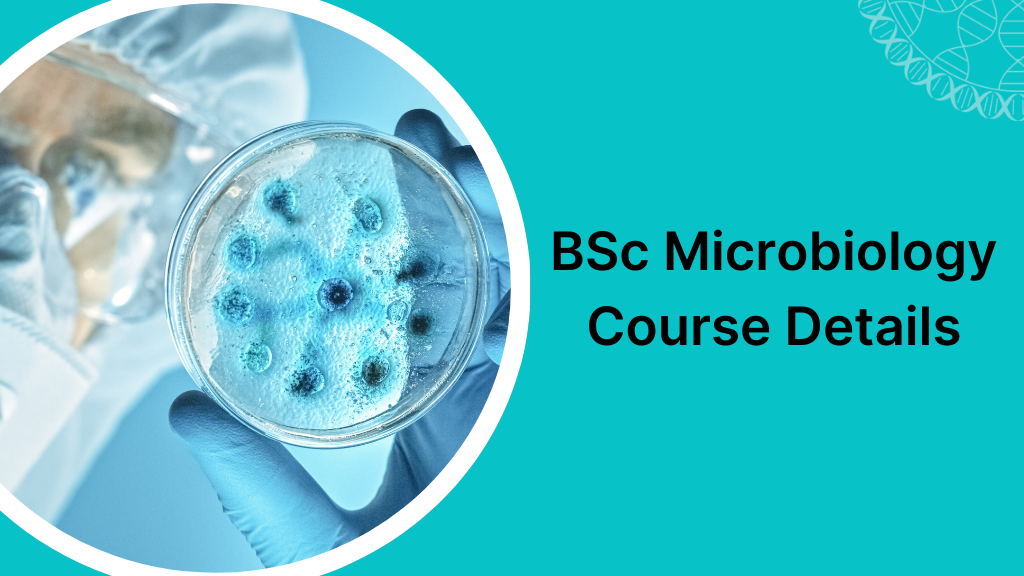
BSc Microbiology: Course Details, Syllabus, Jobs, Salary, and Career Scope

24-Mar-2025
BSc Microbiology: Course Details, Syllabus, Jobs, Salary, and Career Scope
Introduction to BSc Microbiology
BSc Microbiology is a three-year undergraduate degree that focuses on the study of microorganisms such as bacteria, viruses, fungi, and protozoa. This course provides in-depth knowledge of microbiology, laboratory techniques, and applications in healthcare, agriculture, pharmaceuticals, and biotechnology.
With advancements in science and technology, microbiology has become an essential field with vast career opportunities in research, diagnostics, and industrial applications. Students who pursue this course can work in various sectors, including healthcare, food processing, and environmental sciences.
Eligibility Criteria for BSc Microbiology
To enroll in a BSc Microbiology course, candidates must meet the following eligibility criteria:
- Must have completed Class 12 (10+2) from a recognized board.
- Should have studied Biology, Chemistry, and Physics as core subjects.
- Minimum marks required vary between 50-60%, depending on the college or university.
- Some institutions may conduct entrance exams for admission.
BSc Microbiology Course Duration and Fees
- Course Duration: 3 years (divided into 6 semesters)
- Course Fees: INR 50,000 to 3,00,000 per year (varies based on government/private colleges)
BSc Microbiology Syllabus
The syllabus of BSc Microbiology covers both theoretical and practical aspects of microbiology. Here is a semester-wise breakdown:
Semester 1
- Introduction to Microbiology
- Fundamentals of Cell Biology
- Biochemistry
- Microbial Diversity
- Practical Lab Work
Semester 2
- Microbial Physiology and Metabolism
- Molecular Biology
- Immunology Basics
- Biostatistics and Computer Applications
- Practical Lab Work
Semester 3
- Environmental Microbiology
- Food and Dairy Microbiology
- Industrial Microbiology
- Genetic Engineering
- Practical Lab Work
Semester 4
- Medical Microbiology
- Agricultural and Soil Microbiology
- Virology
- Bioinformatics
- Practical Lab Work
Semester 5
- Parasitology
- Pharmaceutical Microbiology
- Biotechnology Applications
- Research Methodology
- Practical Lab Work
Semester 6
- Clinical Microbiology
- Microbial Genetics
- Applied Microbiology
- Dissertation/Research Project
- Practical Lab Work
BSc Microbiology Scope in India
Microbiology is a rapidly growing field in India with increasing demand in various industries, such as:
- Healthcare & Pharmaceuticals: Disease diagnosis, vaccine development, and drug manufacturing.
- Agriculture: Biofertilizers, soil microbiology, and pest control.
- Food Industry: Quality control, fermentation processes, and food preservation.
- Research & Development: Scientific research in microbiology and biotechnology.
- Environmental Science: Waste management, pollution control, and bio-remediation.
Career Options after BSc Microbiology
Graduates with a BSc Microbiology degree have several career opportunities in different industries. Some of the job roles available are:
- Microbiologist – Conducts research on microorganisms and their impact on human health, agriculture, and industries.
- Medical Microbiologist – Works in hospitals and labs to diagnose infectious diseases.
- Industrial Microbiologist – Works in pharmaceutical or food industries ensuring product quality and safety.
- Quality Control Analyst – Ensures food, pharmaceuticals, and industrial products meet safety and quality standards.
- Biomedical Scientist – Works in healthcare to research diseases and develop new treatments.
- Research Assistant – Assists in laboratory research in universities and research institutes.
- Environmental Microbiologist – Studies microbial activities in the environment and their applications.
- Food Technologist – Works in food processing industries for quality assurance and innovation.
Top Recruiting Companies for BSc Microbiology Graduates
- Dr. Reddy’s Laboratories
- Serum Institute of India
- Biocon
- Ranbaxy Laboratories
- Nestlé India
- Britannia Industries
- Dabur India
- Hindustan Unilever
- Tata Chemicals
Government Jobs after BSc Microbiology
Candidates can also apply for government jobs in research institutes, healthcare departments, and environmental organizations. Some of the government sectors hiring microbiologists include:
- Indian Council of Medical Research (ICMR)
- Food Safety and Standards Authority of India (FSSAI)
- National Centre for Disease Control (NCDC)
- Public Health Laboratories
- State Pollution Control Boards
- Central Drug Research Institute (CDRI)
Salary after BSc Microbiology in India
The salary of a microbiology graduate varies based on job profile, experience, and industry. Below is an estimate of salaries in India:
- Entry-Level (0-2 years): INR 2.5 - 4 LPA
- Mid-Level (3-5 years): INR 4 - 6 LPA
- Senior-Level (5+ years): INR 6 - 10 LPA
Job-wise Salary Estimate:
- Microbiologist: INR 3.5 - 6 LPA
- Medical Microbiologist: INR 4 - 8 LPA
- Quality Control Analyst: INR 3 - 5 LPA
- Research Scientist: INR 6 - 10 LPA
Higher Studies after BSc Microbiology
Many students opt for higher studies to specialize in microbiology and improve career prospects. Some popular postgraduate courses include:
- MSc Microbiology
- MSc Biotechnology
- MSc Applied Microbiology
- MSc Medical Microbiology
- MSc Food Technology
- MSc Environmental Microbiology
- PhD in Microbiology
Higher studies can lead to research-oriented jobs in top institutes like AIIMS, ICMR, IISc, and IITs.
Conclusion
BSc Microbiology is a promising course that offers diverse career opportunities in healthcare, pharmaceuticals, food, and environmental sectors. With increasing research in microbiology, graduates have the potential to work in well-paying jobs and contribute to advancements in science and medicine.
If you are interested in exploring microorganisms and their applications, BSc Microbiology is an excellent career choice with a bright future in India and abroad.
FAQs on BSc Microbiology
1Q: What is BSc Microbiology?
Ans: BSc Microbiology is a 3-year degree course that studies tiny living things like bacteria, viruses, and fungi. It covers topics like diseases, food safety, and medicines.
2Q: Who can join BSc Microbiology?
Ans: Students who have passed 12th with Biology, Chemistry, and Physics can apply. Most colleges require at least 50% marks.
3Q: What subjects are taught in BSc Microbiology?
Ans: Some important subjects include:
- Microbial Genetics
- Immunology (study of body defense)
- Virology (study of viruses)
- Medical Microbiology
- Industrial and Food Microbiology
4Q: What jobs can I get after BSc Microbiology?
Ans: You can work in:
- Hospitals and labs
- Medicine and vaccine companies
- Food and dairy industries
- Research centers
- Environmental agencies
5Q: What are the common job roles?
Ans: Some popular jobs are:
- Microbiologist
- Lab Technician
- Quality Control Officer
- Research Assistant
- Food Safety Officer
6Q: How much salary can I get after BSc Microbiology?
Ans: Freshers can earn between ₹2.5 lakh – ₹6 lakh per year, depending on the job and company.
7Q: Can I study further after BSc Microbiology?
Ans: Yes, you can do MSc Microbiology, MSc Biotechnology, or research courses for better career options.
8Q: Are there government jobs after BSc Microbiology?
Ans: Yes, you can apply for jobs in:
- ICMR (Indian Council of Medical Research)
- FSSAI (Food Safety and Standards Authority of India)
- Public health labs and hospitals
9Q: Is BSc Microbiology a good career choice?
Ans: Yes, microbiologists are needed in healthcare, food, and research industries. The demand for experts is increasing in India and abroad.
10Q: Can I become a scientist after BSc Microbiology?
Ans: Yes, but you need to study further. Doing MSc and PhD in Microbiology can help you become a scientist in research labs or universities.

AUTHOR

Related Jobs


